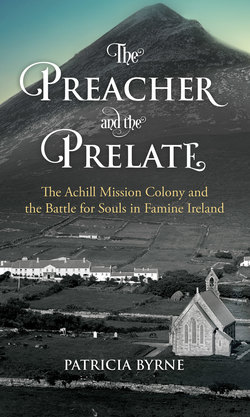Читать книгу The Preacher and the Prelate - Patricia Byrne - Страница 10
На сайте Литреса книга снята с продажи.
ОглавлениеPrologue
Achill Island: I am sitting in a pub on a western island off Ireland’s Atlantic coast in a crowded, damp room after an island outing as part of an arts weekend programme. Coats steam across the backs of chairs, wellington boots squeak and black Guinness overflows on white formica table-tops. Cold hands reach greedily for sandwich triangles piled high on plates and cups rise to receive the flow of steaming tea from large stainless-steel teapots.
We are within shouting distance of the Atlantic Ocean across which the rain has surged through the morning. Behind us are the hill slopes where we stood a half-hour ago among the stone ruins of what was once an outpost of an island mountain colony: the Achill Mission – a nineteenth-century settlement that sought to evangelise and civilise an isolated west-of-Ireland island community.
People settle, grateful for the warmth of a glowing fire and sustenance. It is 180 years since Edward Nangle landed on the northern shores of this island to establish his enterprise on the mountain slopes of Slievemore. A spectacle soon appeared, one never before witnessed by the island people. A village of neat slated houses sprang up and land was reclaimed on the barren mountain. In a place where education was entirely absent, schools buzzed with children learning the Bible in their native tongue. There was a hospital and a dispensary, and a hotel soon followed bringing visitors in droves to view the island’s awesome natural beauty. Hundreds received employment and food during the Great Famine years, saving many from certain calamity.
There is a visceral pull to this story, as if I am being lured back to an ancestral space. My birthplace is less than an hour’s drive from this island in a series of townlands where all of my great-grandparents were born in the middle decades of the nineteenth century when the Achill Mission thrived and food famine swept the country. I have a sense that I can delve deeper into my own story by following the twists and turns of this island’s narrative.
The speaker is forceful. The time has come to reclaim the Achill Mission and its founder, Edward Nangle, whose achievement was impressive given the remoteness and barrenness of the place and the destitution of the people he came to save. His legacy is one of modernisation, enterprise, education, tourism development and advancement – civilisation. The time is surely right to look upon the Achill Mission and its founder in a new light.
The room appears to quieten, the rattle of crockery and cutlery no longer deafening. It is an uneasy quiet, like the calm before a storm, or an intake of breath. There is a disquiet in the audience and a sense that not all present agree with the speaker’s assessment. Within minutes there is an outburst of charged, passionate exchanges as the legacy of Edward Nangle and his colony are fiercely contested.
‘We are talking about the Achill Mission, a sectarian, ugly and obnoxious episode in our history.’
‘That’s not the whole story,’ came the retort. ‘Did the Achill Mission not save the lives of hundreds of islanders during the Great Famine, by giving the people employment and feeding the children in the schools? That can’t be forgotten.’
‘Nangle detested our people, their religion, their culture, their laughter and drunkenness. For him, they were savage, uneducated and degenerate barbarians.’
‘What about the mission women and their hardship?,’ asked another. ‘Eliza Nangle was a broken woman, and her remains and those of her children were laid to rest here in Achill on the slopes of Slievemore.’
These are sharp, angry words. Watching on, I vacillate, swayed in turn by the urgings of both sides, transfixed by the inflamed passions in the room.
‘Edward Nangle was a vicious, vile, vindictive man. He robbed us of our most precious possessions, offering our ancestors food in return for their faith in their hour of greatest need.’
‘Those are unfair charges,’ a man objected loudly. The Achill Mission initiated development and modernisation on the island and took the place out of the dark ages. Open your eyes and you can see the signs of that work all around to this very day.
There is no let-up in the rancorous din, disagreement and discord, arguments for and against. It feels like a hot house. I hear a tumbling rush of waters in the pub gutters and the misted windows run with drips, obliterating the Achill heath outdoors.
What are the rights and the wrongs of the Achill Mission, and how can these distant nineteenth-century events excite such passions?
I realise that, beneath the emotive exchanges, large and weighty issues loom. What happens when an outside force with a vigorous agenda descends upon an isolated community, when the forces of religion, imperialism, famine and landlordism coalesce like a whirlpool on a remote Atlantic island? What brought a stream of nineteenth-century commentators to Achill to observe with fascination this island settlement?
Is this, when all is said and done, a narrative about the fusion of good and bad and the seduction of idealism by other forces?
I am hooked by the story. I decide to retrace these events, walk the places where they were played out, search the archives, and listen to the stories handed down by the people.
